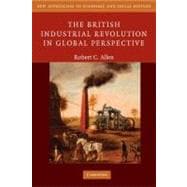
Note: Supplemental materials are not guaranteed with Rental or Used book purchases.
Purchase Benefits
What is included with this book?
| List of plates | p. vi |
| List of figures | p. vii |
| List of tables | p. ix |
| Acknowledgments | p. x |
| The Industrial Revolution and the pre-industrial economy | p. 1 |
| The pre-industrial economy | p. 23 |
| The high-wage economy of pre-industrial Britain | p. 25 |
| The agricultural revolution | p. 57 |
| The cheap energy economy | p. 80 |
| Why England succeeded | p. 106 |
| The Industrial Revolution | p. 133 |
| Why was the Industrial Revolution British? | p. 135 |
| The steam engine | p. 156 |
| Cotton | p. 182 |
| Coke smelting | p. 217 |
| Inventors, Enlightenment and human capital | p. 238 |
| From Industrial Revolution to modern economic growth | p. 272 |
| References | p. 276 |
| Index | p. 313 |
| Table of Contents provided by Ingram. All Rights Reserved. |
The New copy of this book will include any supplemental materials advertised. Please check the title of the book to determine if it should include any access cards, study guides, lab manuals, CDs, etc.
The Used, Rental and eBook copies of this book are not guaranteed to include any supplemental materials. Typically, only the book itself is included. This is true even if the title states it includes any access cards, study guides, lab manuals, CDs, etc.